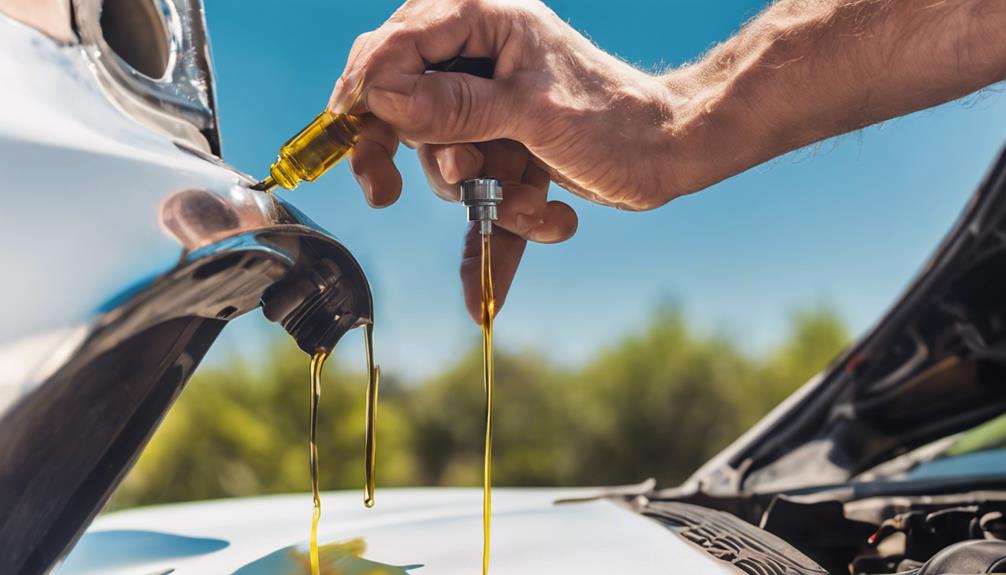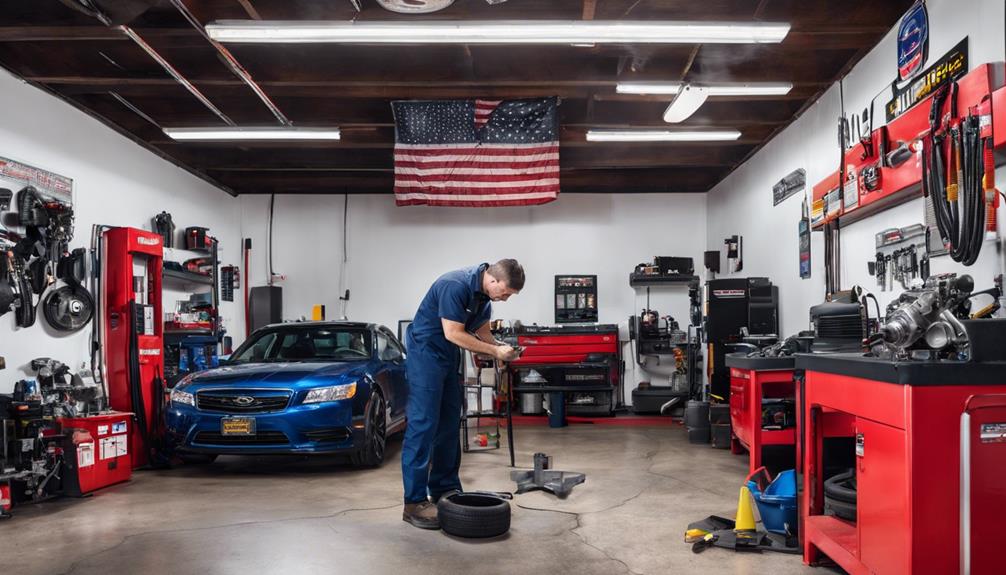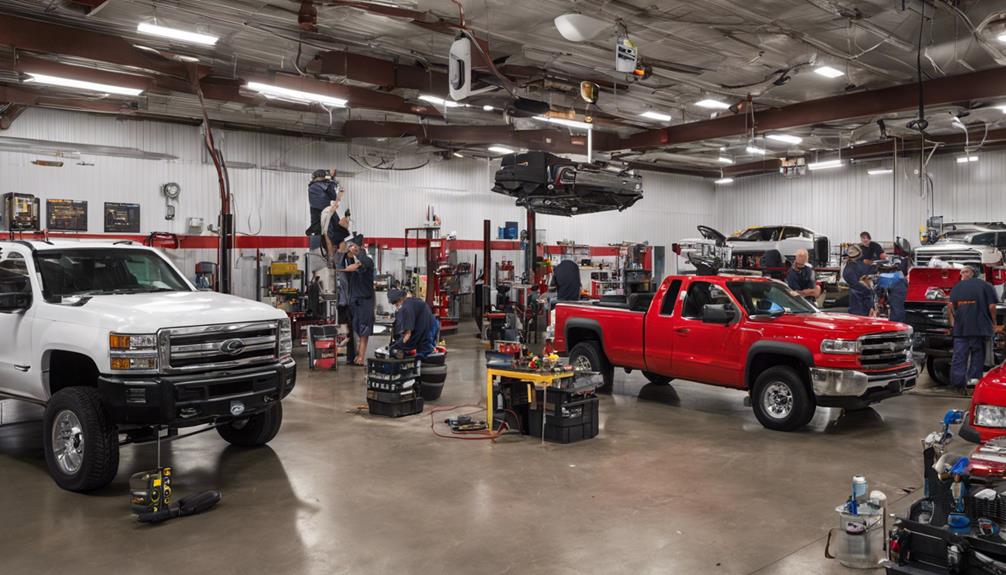Getting an oil change in Brownsville, TX, is essential for keeping your vehicle running efficiently. Regular oil changes improve engine performance by reducing friction and enhancing lubrication. Fresh oil helps with cooling and can even enhance your fuel efficiency. It's also important to choose the right type of oil, like synthetic for maximum protection. Don't forget to check your oil level regularly to prevent expensive engine damage. Local spots like Walmart Auto Care Center offer budget-friendly options and quality service. There's much more to maintaining your vehicle, so you might want to explore all the advantages you can gain.
Key Takeaways
- Visit Walmart Auto Care Center at 2721 Boca Chica Blvd for reliable oil change services in Brownsville, TX.
- Contact Walmart Auto Care at 956-544-0394 for appointments or inquiries regarding oil changes.
- Choose popular motor oil brands like Mobil 1, Pennzoil, and Shell Rotella available at local service centers.
- Utilize oil change coupons to save on maintenance costs while ensuring engine health.
Importance of Regular Oil Changes
Regular oil changes are essential for keeping your vehicle running smoothly and ensuring its engine remains in top condition. By prioritizing regular oil changes, you're not just maintaining your car; you're investing in its future. One of the key oil change benefits is enhanced engine maintenance. Fresh oil helps lubricate the engine components, reducing friction and preventing wear and tear. This means your engine can operate more efficiently, which translates to better performance and longevity.
Additionally, regular oil changes play a significant role in cooling your engine. Over time, oil breaks down and loses its effectiveness, leading to overheating and potential damage. By sticking to a consistent oil change schedule, you help protect your engine from these risks, ensuring it runs smoothly for years to come.
You'll also notice improved fuel efficiency when you keep up with oil changes. Cleaner oil allows your engine to work more efficiently, saving you money at the pump. Following your manufacturer's recommended oil change intervals is key to maximizing these benefits. With proper care, your vehicle will not only perform better but also feel like an integral part of your life.
Choosing the Right Oil

Choosing the appropriate oil for your vehicle is vital, as various oil grades can greatly impact engine performance and longevity. When it comes to oil grade selection, you've got options: conventional, synthetic, and full synthetic. Each offers different levels of engine protection and efficiency, so it's essential to choose wisely.
Synthetic oils, for instance, are known for their superior lubrication properties, which can enhance your engine's performance. They often last longer between changes, making them a cost-effective choice in the long run. Full synthetic oils take it a step further, providing maximum protection against engine wear and tear. This means your engine can run smoother and last longer, giving you peace of mind on the road.
Checking Oil Level

Checking your oil level regularly is essential for keeping your engine running smoothly and avoiding costly repairs. You'll need a dipstick for accurate readings, and it's best to check when the engine is cool and on a flat surface. If you notice signs of low oil, don't wait—address it immediately to prevent potential engine damage.
Importance of Regular Checks
Monitoring your oil level consistently plays a pivotal role in maintaining your engine's health and performance. Regular checks not only improve oil quality but also contribute to effective engine lubrication, which is essential for your vehicle's overall efficiency. Here are four key reasons to prioritize checking your oil level:
- Prevents Engine Wear: By monitoring your oil, you can prevent excessive wear and tear, ultimately prolonging your engine's lifespan.
- Enhances Performance: Proper oil levels ensure that your engine runs smoothly, helping maintain peak performance and responsiveness on the road.
- Improves Fuel Efficiency: A well-lubricated engine operates more efficiently, leading to better fuel economy and cost savings in the long run.
- Early Issue Detection: Regular checks can help you identify potential problems before they escalate into costly repairs, keeping your vehicle reliable.
Incorporating these simple maintenance checks into your routine creates a sense of belonging to a community that values vehicle care and longevity. So, take the time to check your oil regularly, and you'll be rewarded with a well-performing vehicle that serves you well for years to come.
Tools for Checking Oil
Regular oil checks are simple with the right tools, and the most significant one you'll need is the dipstick that comes with your vehicle. Knowing how to use the oil dipstick properly can save you time and guarantee your engine runs smoothly. Here's a quick guide to help you through the proper procedure:
| Step | Action | Purpose |
|---|---|---|
| 1. Park on a level surface | Ensure the vehicle is stable | Accurate reading |
| 2. Remove the dipstick | Pull it out carefully | Access the oil level |
| 3. Wipe it clean | Use a lint-free cloth or paper towel | Remove oil for clear reading |
| 4. Reinsert fully | Push it back into the tube | Reset for accurate measurement |
| 5. Pull it out again | Check where the oil level falls | Determine if oil is sufficient |
The oil level should ideally fall between the two markers on the dipstick. Regularly checking and maintaining your oil level is essential for preventing engine damage and ensuring peak performance. By mastering this simple tool, you're taking a fundamental step toward caring for your vehicle and keeping it running well.
Signs of Low Oil
Noticing unusual engine noises or a drop in performance are often the first signs that your vehicle may be low on oil, signaling the need for immediate attention. Ignoring these signs can lead to serious engine damage and costly repairs. Here are some key indicators to look out for:
- Engine Knocking: If you hear a persistent knocking sound, it's a strong signal that your engine lacks proper lubrication.
- Ticking Noises: Ticking sounds, especially during idling, can indicate low oil levels or insufficient oil pressure.
- Dashboard Warning Lights: Keep an eye on your dashboard—any oil warning light means it's time to check your levels.
- Decreased Performance: If your car isn't accelerating smoothly, low oil could be the culprit, affecting engine efficiency.
Regularly checking your oil level can help you catch these issues early. Don't wait until it's too late; addressing low oil levels promptly can save you from potential engine failure. Your vehicle deserves attention, and by staying proactive, you're ensuring its longevity and performance.
Multi-Point Vehicle Inspection

When you get a multi-point vehicle inspection, you're ensuring every vital aspect of your car is checked for safety and performance. This process covers key areas like tire condition, brake system health, and fluid levels, all essential for a smooth drive. Understanding what's involved in this inspection can help you keep your vehicle running reliably and efficiently.
Inspection Process Overview
A thorough multi-point vehicle inspection is essential for guaranteeing your car's safety and performance, as it covers critical areas like engine oil levels, tire condition, and battery health. Regular inspections not only help maintain prime driving conditions but also provide peace of mind knowing your vehicle is in top shape.
Here are key components of the inspection process you can expect:
- Engine Oil Levels: Checking oil levels to prevent engine damage.
- Tire Condition: Examining tread wear and pressure for improved traction.
- Battery Health: Evaluating battery performance to avoid unexpected breakdowns.
- Fluid Levels: Verifying brake, coolant, and transmission fluids to ensure smooth operation.
Key Inspection Areas
Regularly checking key inspection areas during a multi-point vehicle inspection is necessary for ensuring your car remains safe and reliable on the road. One important aspect is tire pressure; maintaining the right pressure not only optimizes your vehicle's handling but also enhances fuel efficiency. If your tires are under-inflated, you risk uneven wear and poor traction, which can lead to unsafe driving conditions.
Another significant area to inspect is engine performance. A well-functioning engine is the heart of your vehicle, and regular checks can help identify potential issues early. During the inspection, mechanics will look at fluid levels, battery health, and the overall condition of the engine, ensuring it runs smoothly and efficiently.
Additionally, don't overlook the significance of checking your wiper blades and glass. Clear visibility is essential for safe driving, especially during inclement weather. The brake system's condition is also verified, as it plays a key role in stopping your vehicle effectively. By prioritizing these key areas during a multi-point inspection, you're not just maintaining your vehicle; you're ensuring peace of mind for you and your passengers on every journey.
Battery Health Assessment

Evaluating your battery's health is essential for preventing unexpected breakdowns and maximizing your vehicle's performance. Regular battery maintenance checks can save you from the inconvenience of being stranded and help keep your car's electrical system functioning properly. Using advanced diagnostic tools during assessments allows you to detect potential issues early, avoiding costly repairs down the line. Here are four key aspects to focus on during your battery health assessment:
- Connection Inspection: Check that all connections are tight and free from corrosion to maintain peak electrical flow.
- Voltage Check: Use diagnostic tools to measure the voltage output, which indicates the battery's capacity to hold a charge.
- Physical Condition: Examine for any signs of swelling, leaks, or damage to the battery casing.
- Age Assessment: Take into account how long the battery's been in use; most batteries last around three to five years.
Benefits of Preventive Maintenance

Preventive maintenance is key to keeping your vehicle running smoothly, as it helps you catch potential issues before they escalate into costly repairs. By staying on top of regular maintenance, you can enjoy significant benefits that go beyond just avoiding breakdowns. One of the most remarkable maintenance benefits is cost savings. When you address small problems early, you'll save money on larger repairs down the line.
Moreover, preventive maintenance ensures peak vehicle performance. Regular oil changes, tire rotations, and fluid checks help your car run efficiently, improving fuel efficiency and saving you money at the pump. This not only enhances your driving experience but also contributes to vehicle longevity. Keeping your vehicle in prime condition means it'll serve you well for years to come.
Additionally, following a manufacturer-recommended maintenance schedule boosts your vehicle's reliability and can help maintain its resale value. Whether you're planning to keep your car for the long haul or eventually sell it, investing in preventive maintenance is a smart choice. So, don't overlook those routine check-ups—your vehicle will thank you for it!
Fleet Service Options

When managing a fleet of vehicles in Brownsville, TX, you'll find that dedicated fleet service options, including quick oil changes and minor repairs, are essential for keeping your operations running smoothly. Prioritizing fleet maintenance not only enhances vehicle performance but also provides significant cost savings over time.
Here are some key benefits of opting for fleet service:
- Quick Oil Changes: Regular oil changes help maintain engine health, ensuring your vehicles run efficiently.
- Personalized Fleet Accounts: Setting up a tailored fleet account streamlines your service experience and keeps your records organized.
- Consolidated Billing: Control your fleet maintenance needs with easy-to-manage billing, making budget tracking a breeze.
- Dedicated Account Managers: Having a dedicated account manager means you'll have support whenever you need it, ensuring your fleet remains in top condition.
Nearby Service Locations

To keep your fleet running smoothly in Brownsville, TX, it's important to know where to find reliable service locations for quick oil changes and other maintenance needs. One of the best nearby options is the Walmart Auto Care Center located at 2721 Boca Chica Blvd. They offer a variety of services including oil changes, tire changes, and battery installations, making it a convenient stop for your fleet's maintenance.
You can reach them at 956-544-0394 for any service inquiries or to schedule an appointment. At Walmart, you'll also find a selection of automotive products, including popular motor oil brands like Mobil 1, Pennzoil, and Shell Rotella, guaranteeing you have the right supplies for your vehicles.
If you're looking to save a bit on your maintenance costs, don't forget to check for oil change coupons that Walmart occasionally offers. These can help you keep your fleet in prime condition without breaking the bank. By familiarizing yourself with these nearby mechanics, you'll secure that your fleet remains dependable and ready for the road ahead.
Frequently Asked Questions
How Often Should I Change My Oil in Brownsville, Tx?
You should change your oil every 5,000 to 7,500 miles, considering Brownsville's climate. Check for local oil change specials to save money while keeping your engine running smoothly and efficiently. Your vehicle deserves it!
Can I Use Different Oil Grades in My Vehicle?
"Don't put all your eggs in one basket." You can mix oil grades, but it's risky. Different oil grade compatibility affects engine performance. Always check your Owner's Manual for the best oil for your vehicle.
What Signs Indicate I Need an Oil Change?
You'll know it's time for an oil change when you notice decreased engine performance, low oil levels, or dark, gritty oil. Regular checks can help maintain your vehicle's health and keep it running smoothly.
Is It Necessary to Use Synthetic Oil?
Using synthetic oil isn't necessary, but it has pros and cons. The benefits include better engine protection and longer intervals between changes, while drawbacks are higher upfront costs. Evaluate your needs to decide what's best for you.
Where Can I Find Discounts for Oil Changes Locally?
You'd think finding discounts for oil changes would be easy, right? Check local promotions from the best mechanics online or sign up for newsletters. Loyalty programs can also lead to some sweet savings.